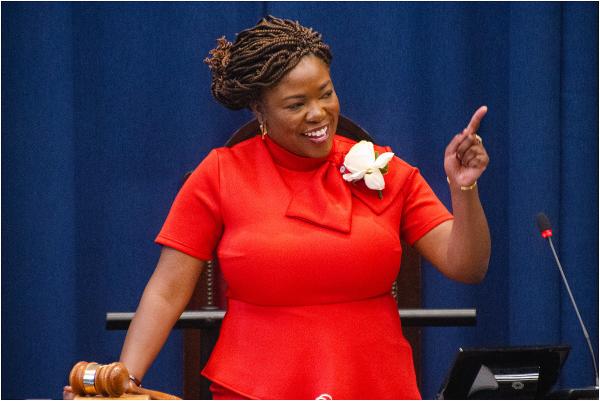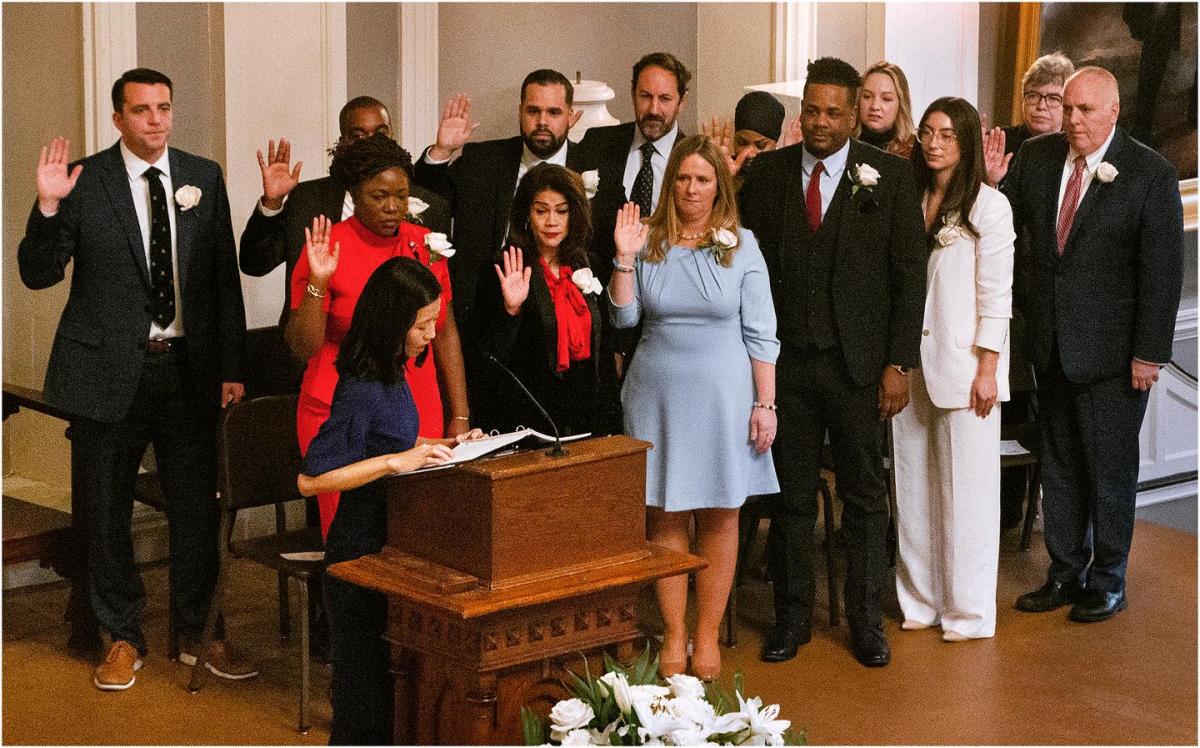January 2, 2024

City Council President Ruthzee Louijeune. Chris Lovett photo
Boston City Councillors began their new term on Monday morning, Jan. 1, with a punctual bow to tradition, salutes to revolutionary change, and an offer to partake of “jou mou,” a favorite Haitian soup made with squash and a medley of other vegetables.
In the historic setting of Faneuil Hall, the thirteen councillors and Mayor Michelle Wu made a processional entry, accompanied by a recording of the prelude to Richard Wagner’s opera “Die Meistersinger.” But, even before the oath of office ritual got underway, a different tone had already been set by Reginald Reed, Jr., who stood alone on the hall’s platform with his alto sax to play “Body and Soul.”
Once the councillors were seated, Wu explained the rule, unaltered for more than 200 years, that their new terms must begin on the first Monday in January, regardless of the date or how late people may have been celebrating the night before. But she lost little time in going from institutional constant to the spirit of change.

The council is sworn-in by Mayor Wu in Faneuil Hall. Chris Lovett photo
“It’s a reminder that, in many ways, our presence here, these councillors’ presence here, is revolutionary,” said the mayor. “And it can be traced back to a group of people deciding to stand up for the freedom we enjoy today. Last month, we commemorated the 250th anniversary of the Boston Tea Party, the embodiment of the fact that democracy is action.”
About two hours later, in City Hall, councillors acted by unanimously voting to make the body’s first Haitian-American member, Ruthzee Louijeune, their new president. After she was nominated, there were cheers from the packed galleries in the council chamber, which was well stocked with family members and supporters, many of them dressed in red and blue, the same colors that some held up and waved on Haitian flags. That prompted one more nod to history, this time from Louijeune.
“January first is Haitian Independence Day,” she noted, “where we’re celebrating the first free Black republic in the western hemisphere — the only country in the world founded from a slave revolt. That's a big deal.”
And the New Year’ Day event in the council chamber was a big deal for one of Louijeune’s community supporters, Dr. Geralde V. Gabeau, founder and executive director of the Immigrant Family Services Institute. While waiting for a chance to be photographed with the council’s new president, she said, “It shows that the fight continues for us to be represented everywhere.”
Commemorating the history with a red dress, along with Haitian-American and City Council pins, Louijeune, like other council presidents, used part of her speech from the rostrum as a mission statement.
“We've got to work to build a city that is affordable for our working-class families, that responds to the potholes and trash issues and the lights that we need in our parks, that centers repairing past harm, works on enhancing community safety and school environments where each student can thrive and realize their limitless potential,” she said.
“Under my leadership, we will continue to center equity in everything we do here in the city of Boston, knowing that the task is a daunting one given our historical failures to show up for those who our governments have marginalized like people of color, immigrants, our LGBTQ-plus neighbors, those who are disabled and differently abled, our veterans, our returning citizens.”
The agenda ranged from housing needs to education gaps, access to city contracts and liquor licenses. But, after a term of heightened friction among councillors, Louijeune also spoke of bridging divides.
“I reject the old and new dichotomy. I believe in a true Boston, one that has always had the richness of cultures and races and backgrounds that we see now in the halls of power,” said Louijeune, adding, “I unequivocally reject any zero-sum mentality…that suggests that for one group to succeed, another must lose.”
During the previous term’s acrimony over redistricting, District 9 (Allston-Brighton) Councillor Liz Breadon was confronted with a localized reminder of sectarian conflict in her native Northern Ireland.
As the current council’s senior member, she opened the meeting by reading a poem written by a fellow Northern Ireland native, Seamus Heaney, “The Cure at Troy.” Torn between strife and hope, the poem made its own nod to history –as possibility:
History says, don’t hope
On this side of the grave.
But then, once in a lifetime
The longed-for tidal wave
Of justice can rise up,
And hope and history rhyme.
With the election of four newcomers, John FitzGerald, Enrique Pepén, Henry Santana and Ben Weber, the council’s head count for of Irish background is hardly greater than for members with roots in the Caribbean island shared, not always amicably, by Haiti and the Dominican Republic. The history and geography were well known to Louijeune and some of her colleagues.
“Are there any Dominicans in the room now?” she asked from the rostrum. “Are there any Haitians in the room now?” From the galleries, one loud cheer was followed by another.
Then she asked, “Can I hear from both the Haitians and the Dominicans in the room?”As two loud cheers swelled in unison, the new president beamed, “I love it. That is possibility that there's unity. Our island, which is often referred to as Hispaniola, we reclaim our tiny name of it, and we work together. Yes, and we won't do it alone.”
Topics:


